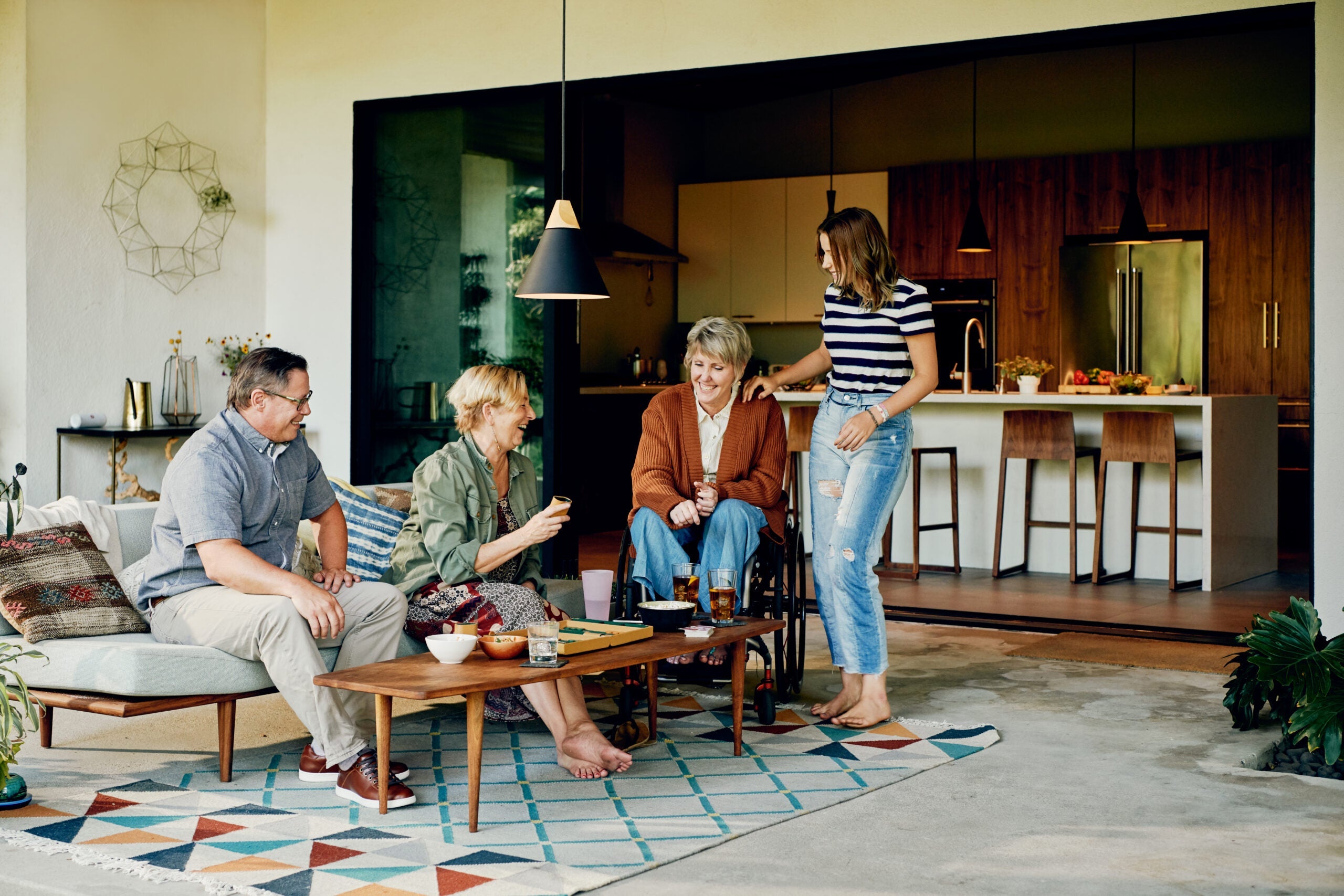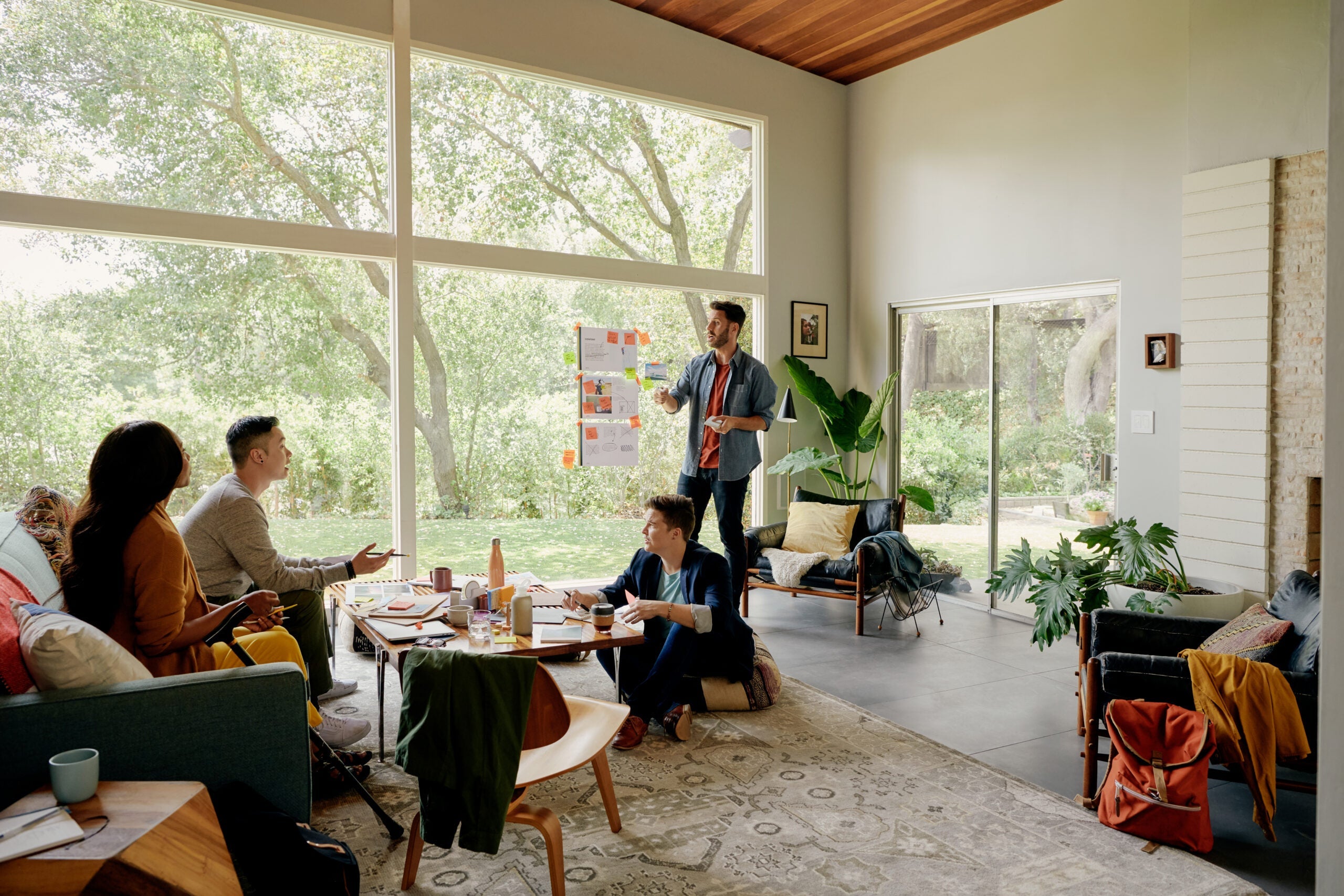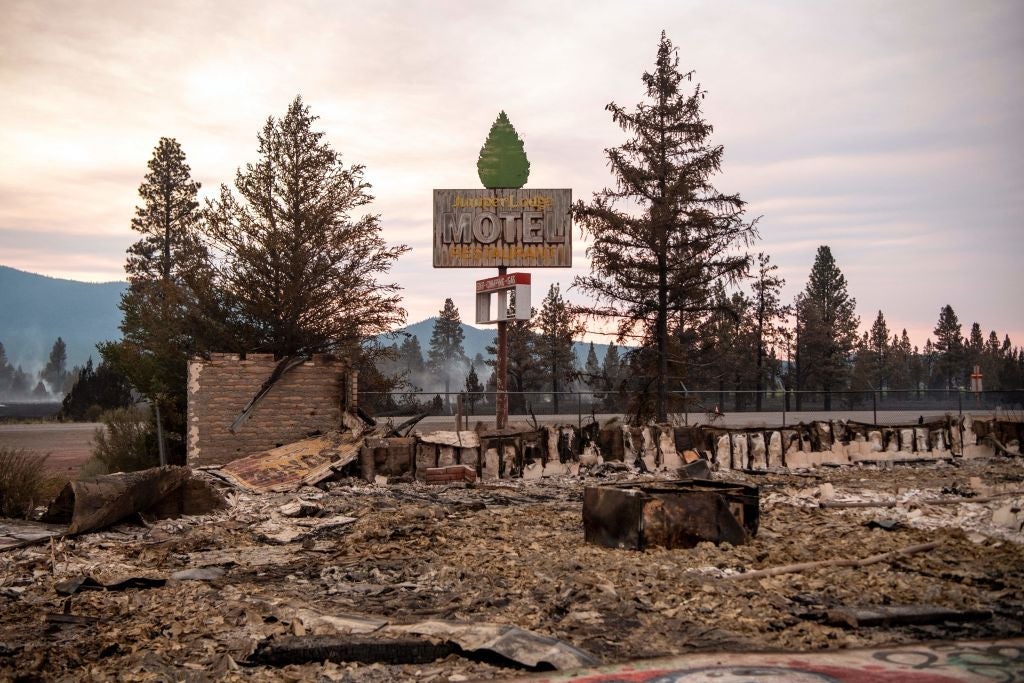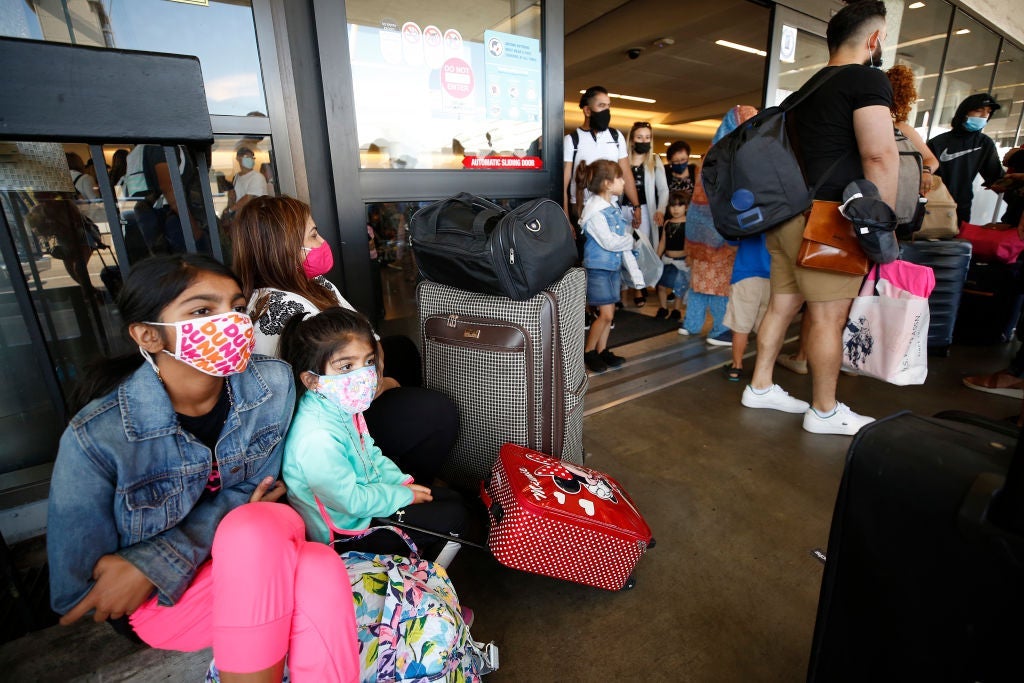New study confirms families are flocking to vacation rentals
It's a trend TPG has been telling you about for more than a year now: Families have discovered the benefits of vacation rentals.
Airbnb and Vrbo saw upticks in rentals of homes that can accommodate more people in both 2020 and 2021, suggesting a rise in family travelers seeking space to enjoy each other's company outside the confines of a traditional hotel room combined with extended weekends facilitated by continued remote work.
Although hotels remain the top choice for lodging among some family travelers according to a recently released joint study by New York University and the Family Travel Association, vacation rental properties grew in popularity in both 2020 and in 2021.
The trend is expected to continue well beyond the pandemic, though obviously, the concerns around COVID-19 fueled it.
This report aligns with data published by Airbnb in September highlighting "measurable increases in nights booked for larger listings" with four or more bedrooms, in addition to "nights booked for family trips from January-August 2021 over January-August 2019."
Related: More hotel brands are offering home sharing
Vrbo has seen similar trends. The original vacation rental marketplace, founded in 1995 and previously known as Vacation Rentals by Owner, recorded the largest increase in demand for properties that sleep seven or more guests in July 2021 compared to July 2019.
"Though Vrbo has been around for over 25 years, a lot of people discovered and experienced the category for the first time during the pandemic because they allowed families to get away together while social distancing and avoiding crowds," Vrbo spokesperson Alison Kwong told me via email. "The record number of people staying in Vrbo vacation homes this year is a mix of families who've been using Vrbo for years, and families who tried a private vacation home for the first time, fell in love with it and wanted to continue staying in this type of lodging for their next family trip."
In July, Vrbo did a giveaway where they gifted one vacation a day for a month to families to "make up for lost time." Their marketing efforts showcasing their 2 million-plus homes across the world have reflected such initiatives.

Scroll through Vrbo's "About" page and you'll find their messaging overtly targets families, with phrases like "We believe in family connection" and "We want families to travel better together."
Related: Travelers warn of last-minute vacation rental cancellations this summer
They even went so far as to update their mission statement: "Our mission is to find every family the space they need to relax, reconnect, and enjoy precious time away together." Case in point, I first heard of Vrbo from my aunt about five years ago when she booked a house in Michigan for a family vacation with her, my uncle and my parents.
Although more subtly, Airbnb, the newer yet perhaps more widely known vacation rental service among travelers, has also shifted its focus to family travel. It comes in response to the increased demand for large accommodations in urban destinations this summer. According to recent data from the company, family travel spiked from 27% of overall nights booked in summer 2019 to 33% in summer 2021 globally, and 31% in the U.S.

These numbers are particularly interesting given Airbnb's existing popularity among younger travelers in cities, reflective of its beginnings as a startup in 2007 when "two Hosts welcomed three guests to their San Francisco home." Startups and millennials go hand in hand, families not so much — at least not traditionally. To date, Airbnb has properties in almost every country, with more than 4 million hosts worldwide.
"Summer travel on Airbnb used to be largely smaller groups visiting big cities," an Airbnb spokesperson said via email. "But this summer, the most popular type of travel is families flocking to remote destinations from their big-city homes."
Beyond cities, Airbnb attributed 42% of the nights booked by family travelers to those in rural destinations, up from 32% in the summer of 2019.
Both companies expect this trend to continue to shape how and why families travel, well beyond the summer months, which are historically the most popular time for families to travel, given there's a two-to-three-month window when kids experience that sweet freedom of summer.
Beyond summer break, families are considering booking homes for holiday travel — homes which, like many things this year, are likely to fill up quicker than in years past.
Read more: Hotels vs. Airbnb: Which should you book during your summer getaway?
"Compared to previous years, families have also been booking Vrbo vacation homes earlier than usual for every popular travel season. We're already seeing heightened demand for Vrbo properties this December compared to previous years, " said Kwong. "Some families were booking vacation homes for the holidays as early as July, and warmer destinations like the Florida Keys and Naples, Florida have fewer than 30% of Vrbo properties still available during the week of Christmas."
However, when it comes to travel, it's no longer just the usual busy times of year that require advance planning when it comes to booking travel accommodations.
"This is a trend that ... will continue into the fall and winter -- and beyond, as part of a larger travel revolution," Airbnb said. "Zoom may not be helpful for business travel but it's good for family travel, and longer weekends that blend work and leisure, made possible by part-time remote work, also will be part of the future."

Largely due to the continuation of remote work, extended weekends are on the rise in the U.S., where three- and four-day weekends with families are up 70% from the second quarter of 2019 to the second quarter of 2021, according to figures shared by Airbnb.
"On average, [vacation rentals] are also more affordable per person than booking separate hotel rooms," said Kwong. Despite previous data suggesting that vacation rentals are cheaper than hotels for long-term stays, a 2021 report from vacation rental data company AirDNA found that average Airbnb and Vrbo home rates have actually increased as travelers gravitate toward larger properties.
Related: 13 mistakes to avoid on your next vacation rental
"For both vacation rentals and resorts, the probability that respondents plan to stay in these accommodation types increases with income – higher income groups are more likely to select these options than lower-income groups," said Dr. Lynn Minnaert, a professor at NYU's Jonathan M. Tisch Center of Hospitality, who published a joint report with the Family Travel Association predicting a steady increase in the popularity of vacation rentals among family travelers in the U.S. in the next 12 months.
When asked to rank their most preferred accommodations for family travel, more than half (54%) of the 2,400 individuals surveyed by Minnaert said they preferred staying at vacation rentals when traveling in the U.S., results which were documented in a report examining overall U.S. family travel trends.
Read more: Maximizing points and miles on vacation rentals with Airbnb and Vrbo
"The vacation rentals' rise in popularity isn't necessarily new: there was already increased interest from families before 2020. However the pandemic seems to have solidified their position," Minnaert said via email, and attributed this to a decline in motels in the U.S.
"This may be at the expense of motels, which have dropped down the list of popular accommodation choices from 3rd place in 2017 to 11th place in 2021," Minnaert continued. "I thought this was interesting as road trips have been so popular."
In 2017, motels were cited as the third most common accommodation option in that year's survey, the sixth most common in 2019, and have now dropped to 11th place. IBISWorld says there are nearly 85,000 hotels and motels currently operating in the U.S., but there is no data to accurately determine the number of hotels versus motels. In his 2021 book, "No Vacancy: The Rise, Demise and Reprise of America's Motels," author Mark Okrant wrote that "approximately 16,000 motels were operating in 2012, a sharp drop from a peak of 61,000 in 1964."

"Vacation rentals have always been a great option for families because they offer space, privacy, attractive amenities and allow everyone to stay together under one roof," Vrbo spokesperson Kwong said.
Read more: How to maximize your stays at Airbnbs, hostels, campgrounds and more
TPG featured card
at Capital One's secure site
Terms & restrictions apply. See rates & fees.
| 5X miles | Earn 5X miles on hotels, vacation rentals and rental cars booked through Capital One Travel |
| 2X miles | Earn unlimited 2X miles on every purchase, every day |
Pros
- Stellar welcome offer of 75,000 miles after spending $4,000 on purchases in the first three months from account opening. Plus, a $250 Capital One Travel credit to use in your first cardholder year upon account opening.
- You'll earn 2 miles per dollar on every purchase, which means you won't have to worry about memorizing bonus categories
- Rewards are versatile and can be redeemed for a statement credit or transferred to Capital One’s transfer partners
Cons
- Highest bonus-earning categories only on travel booked via Capital One Travel
- LIMITED-TIME OFFER: Enjoy $250 to use on Capital One Travel in your first cardholder year, plus earn 75,000 bonus miles once you spend $4,000 on purchases within the first 3 months from account opening - that’s equal to $1,000 in travel
- Earn unlimited 2X miles on every purchase, every day
- Earn 5X miles on hotels, vacation rentals and rental cars booked through Capital One Travel
- Miles won't expire for the life of the account and there's no limit to how many you can earn
- Receive up to a $120 credit for Global Entry or TSA PreCheck®
- Use your miles to get reimbursed for any travel purchase—or redeem by booking a trip through Capital One Travel
- Enjoy a $50 experience credit and other premium benefits with every hotel and vacation rental booked from the Lifestyle Collection
- Transfer your miles to your choice of 15+ travel loyalty programs
- Top rated mobile app


